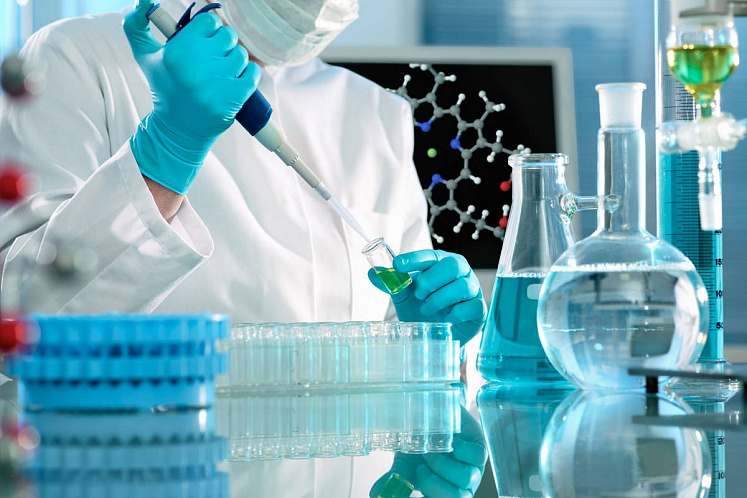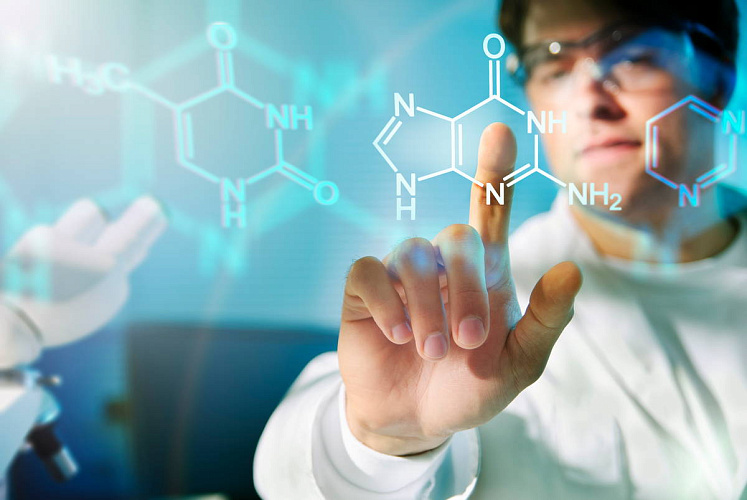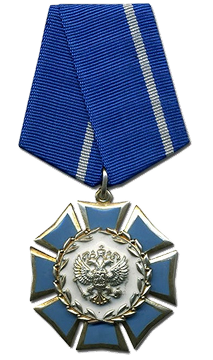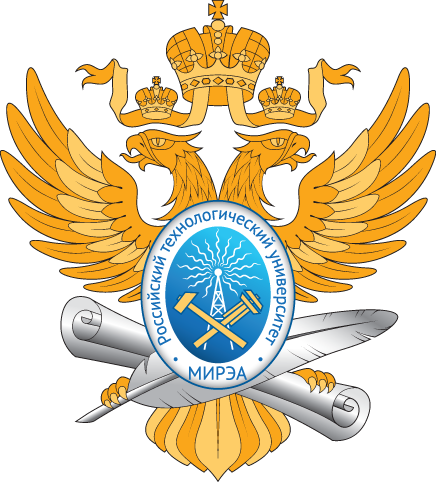04.03.01 Chemistry
This area of training is designed for the students who are interested in studying chemical elements, simple molecules and complex compounds in various states of aggregation, analysis of substances and materials, theoretical foundations of methods of chemical and physical and chemical analysis and their practical application.
Level of education:
Bachelor’s degree
Form of training:
Full-time (day department)
Venue of training:
Moscow
Entrance exams:
— Mathematics (major)
— Russian language
— Chemistry
— Russian language
— Chemistry
Programs, specializations:
Medical and pharmaceutical chemistry

The training program is designed for those who are interested in the synthesis and the biological effect of complex organic compounds with medicinal activity, the development of drugs for cancer diagnosis and treatment, the creation of molecular drug delivery devices and genetic constructs for gene therapy. The professional activity of the alumni involves natural and synthetic biologically active substances with medicinal activity, methods of their production, natural and synthetic polymers used as biomaterials.
The program’s specifics lies in the close integration of students’ educational and research activities with the leading R&D institutes of the Russian Academy of Sciences, which, along with modern educational technologies, provides a high level of professional training for graduates, allows them to gain valuable practical experience in research laboratories, develop their creative potential and analytical skills in medicinal and pharmaceutical chemistry.
The program’s specifics lies in the close integration of students’ educational and research activities with the leading R&D institutes of the Russian Academy of Sciences, which, along with modern educational technologies, provides a high level of professional training for graduates, allows them to gain valuable practical experience in research laboratories, develop their creative potential and analytical skills in medicinal and pharmaceutical chemistry.
Alumni can be employed as
- research chemists
- biochemists
- researchers
- analytical chemists
Program subjects
- Methods for isolation, research and identification of biologically active compounds and polymers
- Chemistry of biologically active compounds
- Synthesis of polymers for biomedical purposes
- Methods for the synthesis of biologically active compounds
- Chemistry of pharmaceuticals
- Polymers in the processes of immobilization and modification of natural compounds
- Basics of creating dosage forms
- Physical chemistry of solutions and gels of polymers
- Stereoselective synthesis of organic compounds
- Polymer materials in medicine
- Calculation methods in medicinal chemistry
• Department of Chemistry and Technology of Biologically Active Compounds, Medical and Organic Chemistry named after N.А. Preobrazhensky
• Department of Chemistry and Technology of Macromolecular Compounds named after S.S. Medvedev
Fundamental and Applied Chemistry

The training program has been developed for students interested in chemical elements, simple molecules and complex compounds in various aggregate states (inorganic and organic substances and materials), obtained as a result of chemical synthesis (laboratory, industrial) or isolated from natural objects, and their practical application.
In the process of training, students receive theoretical knowledge and practical skills in physical, inorganic, organic, colloidal and analytical chemistry, study modern methods of analysis and ways to ensure the reliability of their implementation. Particular attention is given to the preparation and properties of nanoscale materials and methods of their study.
Students are involved in joint research projects with laboratories of research institutes of the Russian Academy of Sciences active in priority areas of development of science and technology.
Alumni can work professionally in various area (education and science, healthcare, agriculture, various types of industry and production), as well as engage in R&D (research and development of new types of products and functional materials, quality control of raw materials, semi-finished products and finished products).
In the process of training, students receive theoretical knowledge and practical skills in physical, inorganic, organic, colloidal and analytical chemistry, study modern methods of analysis and ways to ensure the reliability of their implementation. Particular attention is given to the preparation and properties of nanoscale materials and methods of their study.
Students are involved in joint research projects with laboratories of research institutes of the Russian Academy of Sciences active in priority areas of development of science and technology.
Alumni can work professionally in various area (education and science, healthcare, agriculture, various types of industry and production), as well as engage in R&D (research and development of new types of products and functional materials, quality control of raw materials, semi-finished products and finished products).
Alumni can be employed as
- chemists
- analytical chemists
- expert chemists
- research chemists
Program subjects
- Research methods in chemistry
- Chemistry of transition elements
- Chemical bases of biological processes
- Chemistry of complex compounds
- Modern approaches to planning chemical processes
- Complex compounds
- Practical applications of spectral methods in analytical chemistry
- Technology of colloids and nanosystems
- Principles and practical applications of catalysis
- Synthesis and research methods of coordination compounds
- Theoretical foundations of modern methods of analysis
- Physicochemical foundations of photochemical processes
- Structure formation of dispersed systems
- Modern organic synthesis
- Practical applications of electrochemical methods in analytical chemistry
- Methods for obtaining inorganic compounds
• Department of Inorganic Chemistry named after A.N. Reformatsky
• Department of Analytical Chemistry named after I.P. Alimarina
• Department of Physical Chemistry named after Ya.K. Syrkin
• Department of Colloidal Chemistry named after S.S. Voyutsky
- Educational Activity
-
Institutes
- Institute of Information Technologies
-
Institute of Artificial Intelligence
- About the Institute
- Institute Administration
- History of the Institute
-
Training programs
- Bachelor's Degree Programs
-
Master's Degree Programs
- 01.04.02 Applied mathematics and information science
- 09.04.01. Informatics and computer engineering
- 12.04.04 Biotechnical systems and technologies
- 15.04.04 Automation of technological processes and production
- 15.04.06 Mechatronics and robotics
- 27.04.03 System analysis and management
- 27.04.04 Engineering system control
- Infrastructure
- Alumni
- Contacts
- Institute for Cybersecurity and Digital Technologies
-
Institute for Advanced Technologies and Industrial Programming
- About the Institute
- Institute Administration
- History of the Institute
-
Training programs
-
Bachelor's Degree Programs
- 09.03.02 Information systems and technologies
- 11.03.04 Electronics and nanoelectronics
- 12.03.05 Laser technology and laser techniques
- 15.03.01 Mechanical engineering
- 22.03.01 Materials science and technology
- 27.03.01 Standardization and metrology
- 28.03.01 Nanotechnology and microsystems engineering
- 29.03.04 Decorative material working techniques
- 54.03.01 Graphic design
-
Master's Degree Programs
- 09.04.02. Information systems and technologies
- 11.04.04 Electronics and nanoelectronics
- 12.04.02 Optical engineering
- 15.04.01 Mechanical engineering
- 22.04.01 Materials science and technology
- 27.04.01 Standardization and metrology
- 29.04.04 Decorative material working techniques
- 54.04.01 Graphic design
-
Bachelor's Degree Programs
- Infrastructure
- Alumni
- Contacts
- Institute of Radio Electronics and Informatics
- Institute of Management Technologies
- Lomonosov Institute of Fine Chemical Technologies
- Institute of International Education
-
Mega-Laboratories
- Motion Capture Laboratory
- Immersive Technologies Laboratory
- Laboratory for the Development and Transfer of Microfluidic Technologies (DTMT)
- Cell Technologies Megalaboratory operating on the basis of the Department of Chemistry and Technology of Biologically Active Compounds, Medical and Organic Chemistry named after N.A. Preobrazhensky
- General Biotechnology Megalaboratory
- Industry 4.0: Digital Robotized Production center
- Laboratory of Intelligent Autonomous and Multi-Agent Robotic Systems
- Research and Educational Center for Biosynthesis, Isolation and Purification of Monoclonal Antibodies (Generium)
- Rare and Precious Metals Research and Technological Center operating on the basis of the Department of Chemistry and Technology of Rare Elements named after K.A. Bolshakov
- Laboratory of Analytic, Modeling, Design and Digital Prototyping Technologies
- Import Substitution of Information Technologies Educational and scientific testing complex
- Smart Production Systems Educational and Scientific Center
- Elastomers. Thermoplastics. Technologies Educational and Research Center operating on the basis of the Department of Chemistry and Technology of Elastomer Processing named after F.F. Koshelev
- Catalytic and Mass Exchange Processes center
- Center of Innovative Technologies in Microelectronics
- Center for Cybersports Robotics
- Mobile Robotics University Laboratory
- Radio electronic Technologies Megalaboratory
- Departmental Situation Center of the Ministry of Science and Higher Education of the Russian Federation for monitoring the sphere of education and science
- Scientific and Educational Center for Medical Radiology and Dosimetry
- Laboratory of Geographic Information Systems and Technologies
- Educational and Research Center for Space Monitoring ("CosMoCenter")
- Additive Polymer Technologies Center
- Cyber Threat Research Megalaboratory
- Digital Center of Rosatom State Corporation
- Laser Technologies Megalaboratory
- Mathematical Modeling and Artificial Intelligence Megalaboratory
- Megalaboratory of Digital and Additive Technologies in Mechanical Engineering
- Nanomaterials and Nanostructures Diagnostics Center
- Techno-coworking
- TESLA Educational and Research Center
- Bachelor's Degree Programs
- Master's Degree Programs
- Additional Education Programs
- Physical Education and Sports
© 2026 MIREA - Russian Technological University




